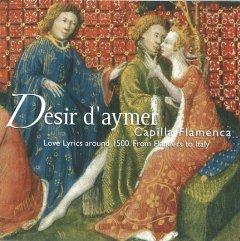Desir d'Aymer (From Flanders to Italy) [2007]
Desir d'Aymer (From Flanders to Italy) [2007]

LOVE'S DESIRE 1. Vincenzo CAPIROLA. Padoana belissima 2. JOSQUIN. Baises moy 3. Alexander AGRICOLA. L'home banni 4. ISAAC, Anon., GHIZEGHEM, JOSQUIN, MARTINI J'ay pris amour/De tous bien plaine 5. Anon. Ick byn zo elende 6. Alexander AGRICOLA. Je n'ay duel LOVE'S PLEASURE 7. Joan Ambrosio DALZA. Calata ala spagnola 8. Loyset COMPERE. Le grand desir 9. Anon. La stangetta 10. Jean MOUTON. James, James, James 11. Jacob OBRECHT. T'sat een meskin 12. Loyset COMPERE. Lourdault, Lourdault 13. Loyset COMPERE. Nous sommes de l'orde de Saynt Babuyn LOVE'S SORROW 14. CAPIROLA, GHIZEGHEM, AGRICOLA Alez Regret 15. Francesco SPINACINO. Recercare 16. AGRICOLA, JOSQUIN, Anon. O Venus bant 17. JOSQUIN. Baises moy (а 6) 18. Joan Ambrosio DALZA. Tastar de corde-Ricercar dietro Love lyrics around 1500. Capilla Flamenca Dirk Snellings – conductor
At the beginning of the twelfth century a new conception of love came in to being at the noble courts in the south of what is now France. In this conception, the woman was placed on a pedestal. The lyrical first person (usually a man, although there were also female versions) sings of love in countless ways. This concept of courtly love formed part of 'courtliness' or courtoisie. The love lyric and its attendant notions of love spread like wildfire through all of Western Europe. Besides these narrative texts, lyric poetry also sang of courtly love. These texts were generally meant to be sung, with or without instrumental accompaniment. If a melody became popular, it could spread far and wide in no time. Professional musicians were able to play or sing a 'ditty' after hearing it just once. Much of this music, together with its text, has thus been lost for the very simple reason that it was never written down in the first place. Ottaviano dei Petrucci started collecting these popular melodies and published three books of secular music: the Harmonice musices odhekaton A (roughly translated, 'One hundred polyphonic melodies, part A') and the subsequent Canti B & C.
The melodies and texts on this CD of love lyrics represent three stages of love. The first of these is the Minne verlangen (love's desiring), in which the lover yearns for a reward, for instance in the form of a kiss (as in Baisés moy on a melody by the Fleming Josquin Desprez). Minne plezier (love's pleasure) sings the praises of being together (as in Le grand désir). It can't be roses all the time, however: the lover can be spurned or ignored. Minne verdriet (love's sorrow) thus turns to the pain of love, as in O venus bant and also in the reprise of Baisés moy: the girl refuses to offer a kiss because her mother once became pregnant from such a kiss! ---outhere-music.com
download: uploaded anonfiles mega 4shared mixturecloud yandex mediafire ziddu








